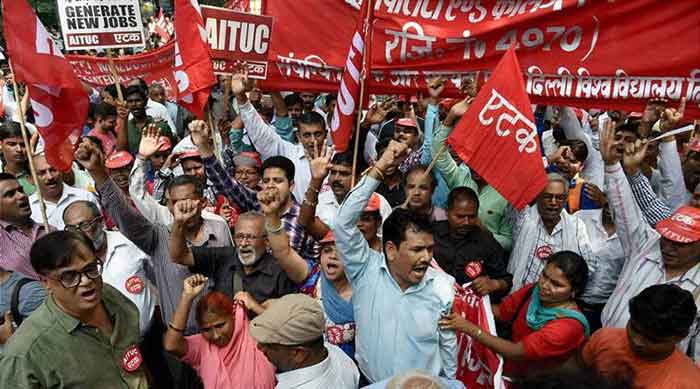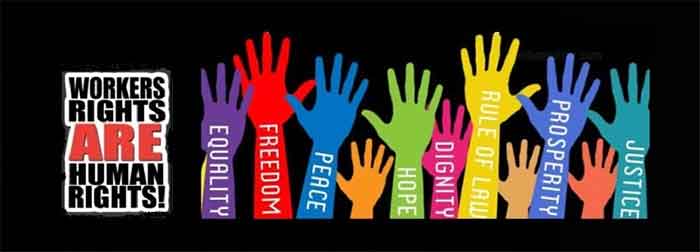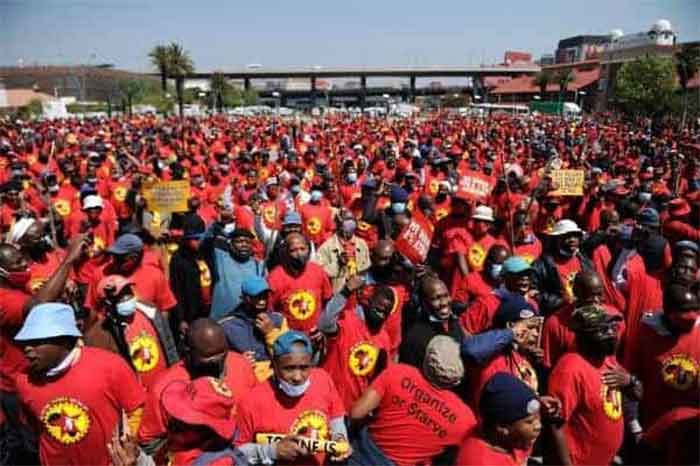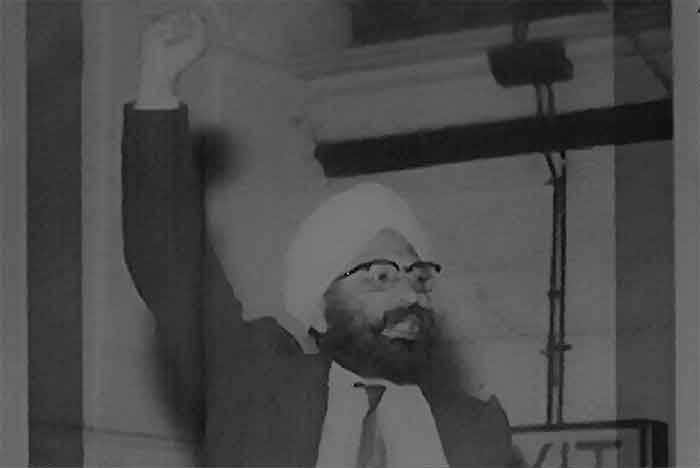
Indicative of the multi-layered responses on ‘worker-employer-government’ problematic that characterises the Covid-19 lockdown days, the Central trade unions have declared a day of protest on 22 May 2020. CTUOs call has come in the wake particularly of the radical changes in the labour laws being initiated by various state governments.
COVID-19, besides the health risks it entail, has also brought in ‘worker’ into the centre of the political, academic, industry, business and media discourses as never before in recent Indian history. However, it is not the rights of workers in the places of work per se that caught the imagination of the above mentioned agencies; rather it was the extreme and desperate measures that hundreds of thousands of workers all over the country took to move from their places of work to their original residences. The policy makers, the industry, the media and public suddenly discovered workers as ‘migrant workers’ in their extreme vulnerable situation without too much bothering to understand the structural and institutional factors that contribute to their vulnerability.
India is one country and the Constitution of India guarantees the right of any citizen to move freely anywhere in the country and to engage in gainful economic activities; simultaneously enjoying all citizenship rights. Constitution guarantees that they should not be subjected to any form of discrimination at work, as workers or at the place of residence, as citizens. The identity they have is that of a worker and that of an Indian. In the same logic, anyone who is working anywhere in the country has the freedom to move back to the place of their original residence, at their discretion.
The lockdown, in the wake of Covid-19 pandemic, announced by PM Narendra Modi on March 24th meant that all activities – economic, social and cultural – that required social association or physical closeness of individuals would cease to be operational. Borders between States were closed and all local, long distance and inter-state mobility by road, train and air was curtailed to ensure total shutdown. The sudden announcement of lockdown by the political leadership, with a notice of just four hours, has actually brought to light the fault lines in not only the status of employment but also of the actual realisation of citizenship rights.
Those who were employed, suddenly lost their jobs and wages; those who were self-employed lost their means of survival. In the absence of any form of social security, workers, mostly categorised as unorganised workers, were left with no money to meet their daily basic expenses.
Over 92 per cent of India’s 500 million workers (extrapolated from the Census 2011 figure of 402.23 million, by the Economic Survey 2016–17) are in the ‘unorganized worker’ category. It entails that the workers are singularly denied the basic labour rights in terms of employment relations and social security.
Making matters worse, workers were confronted with the consequences of the tragic reality of emaciated citizenship rights that they enjoy. They couldn’t access food from Fair Price Shops, they did not have place to live without the threat of being evicted, they dd not have access to water and sanitation and they did not have access to health if fell sick.
Workers started getting out of their residences on to the public roads, railway tracks, walked and are walking en-masse hundreds of kilometres for want of any kind of transport. Some walked alone but others in family; with women and children, with luggage on their heads and little children on their shoulders or holding the hands of older children and adults. Many were on bicycles, two/three wheelers and trucks. Realising public pressure mounting against the administrative callousness, the Central Government arranged long distance train services to ferry workers and the state governments arranged buses. Nevertheless, many perished during their journey, as what happened to 16 workers from steel factory in Julna, Maharashtra, on their way to Madhya Pradesh who were crushed to death near Karmad, Aurangabad by a goods train on 08 May 2020. Similarly, 24 workers were killed when the trucks they were travelling in collided in Uttar Pradesh’s Auraiya district on 16 May 2020.
Meanwhile, the political class is using the crisis situation to impose critical changes in the labour laws of India. This, they argue, is to revive the economy in the paradox came to be termed as ‘life vs livelihood’ dilemma. Such moves are complementary to an out and out neo-liberal agenda of the BJP Government as laid bare by Finance Minister Nirmala Sitaraman on 17 May 2020 on her COVID package announcement.
‘Labour’ being in the concurrent list in the Constitution, the states are on a race to the bottom to make labour laws inoperable and to attract investments. In a bewildering move, on 6 May 2020, UP Government issued a statement announcing that it has cleared ‘Uttar Pradesh Temporary Exemption from Certain Labour Laws Ordinance, 2020’ to exempt all establishments, factories and businesses from the purview of all labour laws for a period of three years. Only the Building and Other Construction Workers Act, 1996, Employees Compensation Act, 1923, Bonded Labour Act, 1976 and Section 5 of the Payment of Wages Act, 1936 (the right to receive timely wages) will apply in the entire state. By another notification issued on 8 May by the UP government the working hours for factory workers were increased from 8 to 12 hours a day and 72 hours in a week from 20 April to 19 July 2020.
Gujarat followed, announcing the next day that new industrial units would be provided with relief from all labour acts and norms for 1,200 days except Minimum Wages Act, Industrial Safety Rules and The Employee Compensation Act. Chief Minister Vijay Rupani added that a total of 33 thousand hectares of land was available for industrial use in Khoraj, Sanand, Dahej SEZ, Dholera SEZ and other private SEZs in Gujarat.
A notification issued by the Madhya Pradesh government on May 5 said that 11 categories of industries including textile, leather, cement, iron and steel, electrical goods, sugar, electricity, public motor transport, engineering including manufacture of motor vehicles will be exempt from the Madhya Pradesh Industrial Relations (MPIR) Act of 1961. It has disabled the applicability of a majority of provisions of the Industrial Disputes Act, 1947 for new manufacturing units that will come up in the next 1,000 days. MP Government has allowed establishments with up to 100 workers to hire according to needs; changed the Contract Labour (Regulation and Abolition) (Madhya Pradesh) Rules, 1973 to allow contractors who supply labour up to 50 to do so without registration; raised working hours to 12 hours from 8 hours in factories and overtime of up to 72 hours; and allowed shops and establishments to operate from 6 am till midnight. The state Government has exempted new factories under the Factories Act, 1948 from inspection from the Labour Department and permitted the flexibility to conduct third party inspections at will.
To put it in perspective, the labour laws that the governments diluted or made defunct include The Industrial Disputes Act, 1947; Trade Unions Act, 1926; Minimum Wages Act, 1948; Payment of Wages Act, 1936; Payment of Bonus Act, 1965; Employees Provident Funds and Miscellaneous Provisions Act, 1952; Employees’ State Insurance Act, 1948; Payment of Gratuity Act, 1972; Factories Act, 1948; Industrial Employment (Standing Orders) Act, 1946; Shops and Commercial Establishments Act, 1953; Contract Labour (Regulation & Abolition) Act, 1970; Equal Remuneration Act, 1976; the Maternity Benefit Act, 1961 and the Unorganised Workers Social Security Act, 2008.
The changes in these laws have impact at five key levels.
1. Recruitment: The changes provide freedom to employers to hire workers at will and fire them at will. It also allows greater freedom for contractors to source and deploy workers.
2. Working Conditions: Most heinous among the moves is the act of raising working hours from the current 8 hours to 12 hours ridiculing not only Indian labour history but also the history of international labour movement beginning 1817, which coined the slogan: “Eight hours’ labour, Eight hours’ recreation, Eight hours’ rest”. The first Convention (No.1 of 1919) by the International Labour Organisation (ILO) introduced a maximum standard working time of 48 hours per week and eight hours per day as an international norm. India ratified the Convention in 1921. Himachal Pradesh, Haryana, Odisha, Maharashtra, Rajasthan, Bihar and Punjab have also enhanced working hours from 8 to 12 hours.
3. Payment of Wages: The changes provide justifications for employers to flout established norms in fixing and disbursement of wages resulting in huge underpayment, non-payment or delayed payment of wages of employees. The non-applicability of Minimum Wages Act can force workers to work for poverty wages.
4. Industrial Relations: Right to form associations or unions is a fundamental right of all citizens of India. Trade Union Act, 1926 legalises this right in the economic sphere and represent the core values and foundations of democratic India. Under the cover of COVID-19, the governments are taking away this right from the people of India. Linked to these are the proposed changes in ID Act, 1947 which will allow easy closures and retrenchments and disturb the existing methods of dispute raising and grievance redressal in establishments in which TUs are active agents.
5. Social Security: It is known that India’s social security provisions are fragmented and that 93% of India’s work force being in informal employment are without any social protection. The COVID-19 related labour law changes discussed above takes away social security rights of the remaining 7% of India’s workforce, who are in the so-called formal employment.
Most importantly, the changes in labour laws are affecting not just the formal workers but all workers; these have universal impact on workers. None of the far reaching changes in labour law have been brought about in consultation with the labour unions, which has prompted the ILO to say in a press note that “such amendments should emanate from tripartite consultation involving the government, the workers’ and the employers’ organisations and be compliant with the international labour standards, including the Fundamental Principles and Rights at Work (FPRW).” What instruments have been used by the Government to make these sweeping changes?
While imposing the lockdown, government of India has invoked Section 6(2)(1) of the National Disaster Management Act (NDMA), 2005. The violation of any of the directives, the order of MHA noted, could attract severe penalties including imprisonment under the NDMA. However, it is not clear whether NDMA gives powers to the government to make changes in labour laws. Most of the states including UP used Section 5 of the Factory Act to bring in changes in working hours, which gives ‘power to exempt during public emergency’, where ‘public emergency’ is defined as “means a grave emergency whereby the security of India or of any part of the territory thereof is threatened, whether by war or external aggression or internal disturbance.”
Are we threatened by war or internal aggression or external disturbance? It is about the metaphors that we use. We are on a war against Corona; the Doctors, nurses, police are Corona warriors; government and the political leadership, supreme commanders. The heartrending experiences of workers on the move to their original places of residence could also be seen as instances of extreme sacrifice to succeed over Corona. As the general public start internalising this narrative, it also gives space and leeway for the authorities in power to undermine civil and democratic rights of the citizens. In the life vs. livelihood narrative, anyone perceived to have the potential to threaten economic revival, here the workers as opposed to investors, are seen as potential enemies to be reigned in.
It takes us to the need for consciously breaking out of the use of war and related metaphors to describe the context and experience of the Covid-19 pandemic. As trade unions prepare for the May 22nd protest day, it is imperative that we start building on a new narrative including assimilating the experiences of the workers on the move as a form of resistance against denial.
J. John is an independent researcher, writer and activist based in New Delhi. Former executive director of the Centre for Education and Communication (CEC) and among the founders of the English bimonthly Labour File, his areas of specialization are unorganized labour and small producers.
SIGN UP FOR COUNTERCURRENTS DAILY NEWS LETTER

















































